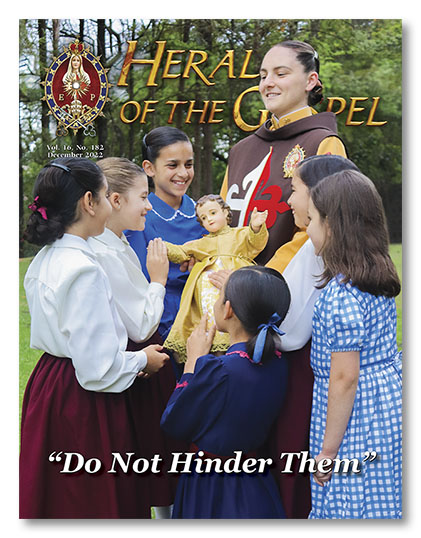The Incarnation of the Word is one of the greatest mysteries of our Faith, even more so when considered in the light of Christmas. In fact, how can the divine infinitude be confined within a child’s body?
There is, however, a profound symbolism in God having become a Child. Firstly, because for the Savior the little children are a model to be imitated: “Let the children come to Me, and do not hinder them; for to such belongs the Kingdom of Heaven” (Mt 19:14). They are an example of candor, innocence and purity.
However, though He fulfilled all the ancient prophecies and made Himself so accessible to men, the Infant God was rejected by His compatriots. When He was about to be born, the houses of Bethlehem closed their doors to Him (cf. Lk 2:7). And it was not long before Innocence Incarnate was hunted by the despot Herod – supposedly “the Great”, although he was so cowardly. In reality, only his cruelty was great. Unaware of the real whereabouts of the Divine Infant, then exiled in Egypt and without a home, the tyrant ordered the murder of all male children two years old and under. If it is better to die than to scandalize even one of the little ones (cf. Lk 17:2), what can be said of this terrible massacre of innocents?
One might object: were they not the protomartyrs of Christ? Indeed, and the Church considers them to be Saints. But if these children had not been torn from their homes and put to death by the sword, would not some of them have become disciples or Apostles of the Lord? What destiny would Providence have confided to them? Ultimately, how many vocations were snatched away at the whim of this infanticidal ruler?
If the death of an innocent man cried out for divine intervention against the evildoer (cf. Gn 4:10), even more can be conjectured, proportionally speaking, about the fate of those who scandalize or lead the little ones astray from the good path, for, as the Lord proclaimed, those who kill the soul are to be feared more than those who kill the body (cf. Mt 10:28).

Such persecutions of the innocent are sometimes perpetrated by the families themselves, as in the cases of the young Thomas Aquinas, Francis of Assisi and Aloysius Gonzaga. As for the arm of the State, the example of the three little shepherds of Fatima, thrown into prison simply for having contemplated the Most Innocent Virgin, is eloquent. Finally, history is relentless in testifying that even ecclesiastics have persecuted the little ones, such as those who frequented the oratories of St. Philip Neri and St. John Bosco.
In today’s world we are witnessing a true massacre of the innocents, but also, and perhaps even worse, a massacre of innocence, especially through the generalized corruption of customs, fomented by the influence of the mass media, the deterioration of education, and the lack of a solid catechesis of children and young people.
Thus, this Christmas we can only wish that peace may prevail for men of good will (cf. Lk 2:14), so that the Supreme Innocence may reach everyone, especially the little ones, safeguarding them from every kind of massacre. ◊
Editorial of the Heralds of the Gospel magazine, #182.

